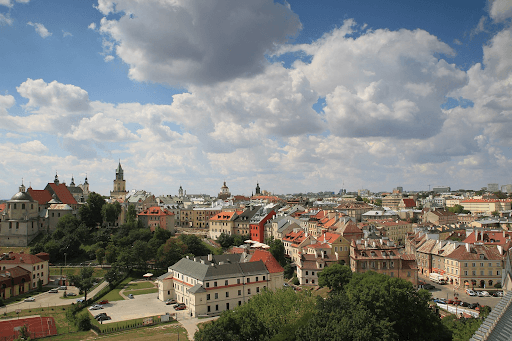A Real Pain marks Jesse Eisenberg’s second feature as a writer-director and his first significant film as a filmmaker. Known for his roles as the anxious, intellectual nerd—starting with his breakout performance in The Squid and the Whale—Eisenberg stays true to form as David, the protagonist of this dark comedic tale. The film follows David and his cousin Benji, played by Keiran Culkin, as they reunite in Poland to honour the memory of their late grandmother, a Holocaust survivor. It’s a story that refuses to let what once was define a people, finding humour and humanity in the face of unimaginable loss.
Through their journey, the story raises a number of profound questions that lie at the heart of modern North American Judaism: How do we confront the legacy of the Holocaust? How do we confront pain? How do we process grief? And most crucially, what does it mean to return to a homeland when no one remains?
At its core, A Real Pain is an exploration of grief. The Holocaust looms over the film like an unspoken shadow, its weight present even in the lightest moments. Eisenberg navigates this heaviness with a balance of humour and pathos. Comedy becomes a tool for processing pain, a hallmark of Jewish storytelling traditions. This approach, reminiscent of Woody Allen’s sardonic humour in Annie Hall, allows Eisenberg to make light of David and Benji’s absurd experiences without trivializing the horror of the Holocaust.
One standout scene exemplifies this balance. Benji breaks down on a train from Warsaw to Lublin, overwhelmed by the absurdity of being a Jew on Polish soil—a place where trains once carried his ancestors to their deaths. Yet, the humour in this moment arises not from Benji’s grief but from the rest of the tour group’s reactions. By finding levity in the responses to tragedy rather than the tragedy itself, Eisenberg honours the Holocaust’s gravity while ensuring A Real Pain remains more than a solemn reflection on suffering.
Eisenberg depicts a Poland where Jewish life has been reduced to cemeteries, memorials, and remnants of a vanished culture. Judaism is dead here. It only exists now as a memory of something that once was. The absence of a living Jewish presence is palpable, underscored by a visit to an old Jewish cemetery. Here, Benji lashes out at the tour’s detached recounting of Jewish history. This time, however, his anger is met with empathy. The tour guide, James (Will Sharpe), shifts from a cold objectivity to a more respectful, intimate acknowledgement of the people buried here, calling one grave occupant “a real human person who lived.” This moment reframes the narrative, challenging the perception of Poland as nothing more than a Jewish graveyard. Yes, the absence is undeniable, but A Real Pain insists on remembering the lives that were. Jewishness in Poland is no longer tangible, yet its memory remains—vivid, defiant, and deeply human.
The recognition of the absence allows the film to answer its central question: What does it mean to go to Poland as a Jew today? The film’s emotional crescendo comes when David and Benji find themselves unable to leave a stone at their grandmother’s doorstop, a traditional act of Jewish remembrance. Instead, David leaves the rock at his own doorstep in New York as a powerful symbol of continuity and resilience. In doing so, he transforms pain into something both personal and universal, a testament to what it means to endure. In this small act, Eisenberg delivers his answer: Poland may no longer hold a living Jewish presence, but Jewish life persists elsewhere.
Powered by Froala Editor






